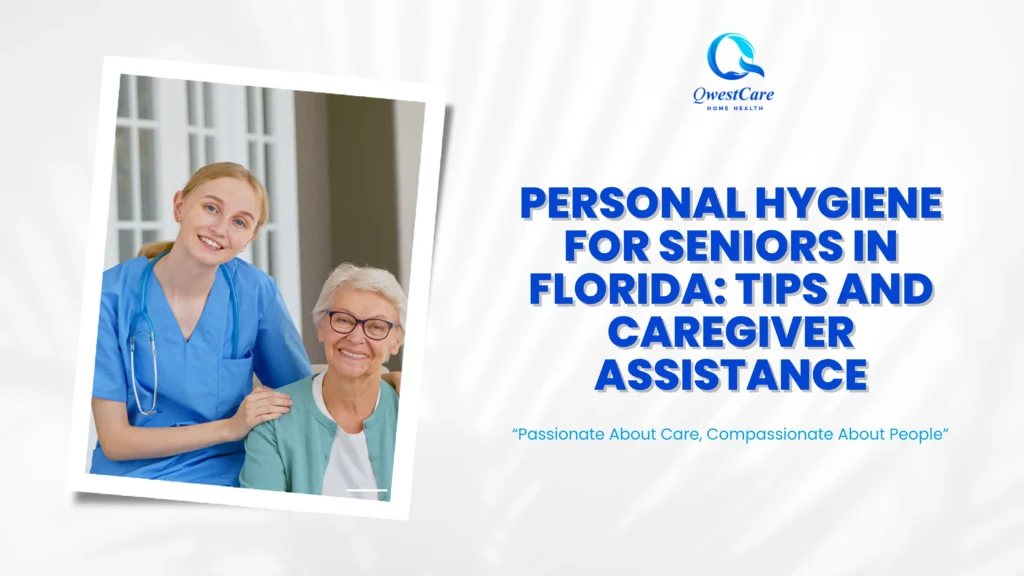Maintaining proper hygiene for seniors is essential for their comfort, health, and emotional well-being. As aging brings unique challenges, caregivers play a vital role in ensuring seniors maintain good personal care habits. This guide offers practical tips for promoting senior hygiene and highlights how caregivers can effectively support elderly individuals.
Why is Personal Hygiene Important for the Elderly?
As people age, physical limitations, cognitive decline, and mobility challenges can make it harder to maintain personal hygiene. Ignoring these routines can lead to serious health risks.
Here’s why hygiene is crucial for seniors:
Proper personal hygiene for seniors reduces the risk of conditions such as urinary tract infections (UTIs), skin irritations, and respiratory issues. Unwashed hands, unclean clothing, and poor bathroom habits can allow harmful bacteria to develop, increasing the risk of illness. Maintaining good hygiene also improves skin health. Aging skin becomes thinner and more delicate, making seniors prone to dryness, irritation, and sores. Regular cleaning, moisturizing, and nail care reduce discomfort and infection risks. For seniors dealing with incontinence, proper skin cleaning is especially crucial in minimizing irritation.
In addition to physical health, hygiene plays a significant role in mental and emotional well-being. Seniors who feel clean and refreshed are more confident and willing to socialize. Poor hygiene can cause embarrassment, withdrawal, and lower self-esteem. Maintaining hygiene routines reduces body odor and discomfort while promoting social interaction. Lastly, hygiene practices can improve mobility and prevent accidents. Clean, dry feet and well-trimmed nails reduce the risk of slips and falls. Proper grooming minimizes discomfort and keeps seniors feeling safe and comfortable in their environment.
Essential Hygiene Tips for Ensuring Proper Hygiene for Seniors
Creating an effective hygiene routine requires patience, compassion, and consistency. Here’s how caregivers can promote better hygiene for seniors:
Bathing and Showering
Bathing and showering can be difficult for seniors with mobility challenges. Caregivers should schedule these routines at a comfortable time for the senior. Installing grab bars, non-slip mats, and a shower chair can help prevent falls and promote safety. Warm water, soft sponges, and mild soap help protect delicate skin.
When assisting with bathing or showering, caregivers should prioritize comfort by maintaining a warm room, using soft towels, and offering calm reassurance throughout the process.
Clothing and Laundry
Clean clothing plays a vital role in maintaining hygiene of the elderly. Seniors should wear breathable fabrics that promote airflow and reduce irritation. Caregivers should help seniors select comfortable, easy-to-wear clothing that is appropriate for Florida’s warm climate. Lightweight garments made of cotton or linen are ideal.
Laundry routines are equally important. Caregivers should ensure that seniors’ clothes, bedding, and towels are washed regularly to prevent odors, skin irritation, and bacteria buildup.
Home Environment and Cleanliness
A clean home promotes better hygiene and comfort for seniors. Caregivers should focus on maintaining a tidy living environment by regularly cleaning common areas, sanitizing frequently used surfaces, and ensuring bathrooms remain dry and clean.
Clutter-free spaces reduce fall risks and ensure seniors can move around safely. Keeping hygiene essentials like soap, tissues, and clean towels easily accessible can also encourage seniors to maintain hygiene habits.
Incontinence Care
Incontinence is common among seniors, and proper care is crucial to prevent skin irritation and infections. Caregivers should encourage regular bathroom visits to minimize accidents. Absorbent products such as protective underwear and disposable pads can help manage incontinence effectively.
Caregivers should prioritize cleaning the skin after each episode to prevent discomfort or odors. Using mild cleansers and applying barrier creams can soothe the skin and reduce irritation.
Oral Hygiene
Seniors are prone to dental issues such as gum disease, tooth decay, and dry mouth. Caregivers should promote regular brushing and flossing using soft-bristled toothbrushes and fluoride toothpaste. For seniors with dentures, caregivers should ensure they are cleaned daily to prevent bacteria buildup.
If seniors struggle with brushing, caregivers can introduce mouth rinses or oral swabs as gentle alternatives. Regular dental checkups are equally important for maintaining healthy gums and teeth.
Skin Care and Moisturizing
Seniors’ skin tends to dry out easily, especially in Florida’s climate. To keep skin healthy, caregivers should encourage seniors to apply moisturizing lotions after bathing or showering. Hypoallergenic creams with minimal fragrance are ideal for preventing dryness and irritation.
Gentle cleansing products, along with moisturizing routines, protect against cracking, itchiness, and inflammation. Caregivers should regularly inspect seniors’ skin for redness, rashes, or sores that may require medical attention.
Nail and Foot Care
Seniors with limited mobility may struggle to maintain proper nail hygiene, increasing the risk of ingrown toenails and infections. Caregivers can assist with trimming or arrange professional nail care as needed. Proper foot hygiene also helps reduce discomfort, odor, and skin irritation.
Caregivers should encourage seniors to wear well-fitted shoes that support comfort and stability to reduce foot pain or balance issues.
How Does a Caregiver Maintain the Personal Hygiene of Elderly Patients?
Caregivers play a critical role in supporting seniors with their hygiene needs. While promoting independence, caregivers ensure that tasks are completed effectively and safely.
1. Ensuring Comfort and Privacy
Caregivers should respect the senior’s privacy and create a calm, comfortable environment during hygiene routines. Ensuring privacy builds trust and reduces anxiety.
2. Promoting Dignity and Control
Allow seniors to choose grooming products or preferred bath times, giving them a sense of control. When seniors feel they have ownership over their hygiene habits, they are more likely to engage positively.
3. Prioritizing Safety
Caregivers should ensure that bathrooms are equipped with grab bars, non-slip mats, and accessible shower products. Ensuring essentials are within easy reach reduces the risk of falls or injuries.
4. Monitoring Skin, Hair, and Oral Health
Seniors may struggle to identify rashes, irritation, or changes in their skin. Caregivers should address concerns promptly and involve healthcare providers if needed.
5. Assistance with Dressing and Clothing Choices
Helping seniors choose clean, comfortable clothing promotes hygiene while improving their confidence. Weather-appropriate clothing also helps seniors stay comfortable in Florida’s warm climate.
6. Adapting to Changing Needs
As seniors’ needs evolve, caregivers should adjust routines to accommodate changes in mobility, skin conditions, or cognitive function. Flexibility ensures hygiene routines remain effective and comfortable.
7. Providing Emotional Support
Hygiene routines can feel vulnerable for seniors. Caregivers should offer empathy, patience, and reassurance to reduce anxiety and promote cooperation.
Best Practices for Caregivers Supporting Senior Citizens Hygiene
Florida’s humid climate presents unique hygiene challenges for seniors. Caregivers should encourage regular bathing to prevent heat rashes, body odor, and skin discomfort. Seniors are more vulnerable to dryness in Florida’s sunny weather, so caregivers should apply moisturizing lotions to keep their skin healthy.
Lightweight, breathable clothing can help seniors stay cool while reducing the risk of skin irritation. Regular hydration is equally important in maintaining skin health and improving overall comfort.
Building a Compassionate Hygiene Routine
For seniors, maintaining personal hygiene is more than just a routine — it’s key to preserving dignity, independence, and emotional well-being. Caregivers play an essential role in supporting hygiene practices that improve seniors’ comfort and overall health.
By following these practical tips and promoting patience, caregivers can create a positive hygiene routine that enhances both physical and mental well-being.



